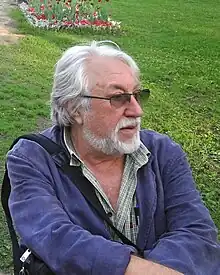
Yury Mikhaylovich Kublanovsky (Russian: Ю́рий Миха́йлович Кублано́вский; 30 April 1947 in Rybinsk) is a Russian poet, essayist, critic and art historian, known for his dissident past, started in the informal literary union SMOG. The author of dozens of lyrical books appearing in America, France, and Russia.
Biography
Yuri Kublanovsky was born in the family of the actor and teacher of Russian literature. His grandfather, a priest, was shot in 1930. In the house of his grandmother kept the atmosphere of pre-revolutionary Russia. Despite the fact that his parents were communists, he was baptized.
He was fond of painting, with 10 years of experience in the art studio at one time wanted to be a painter. Poems, by his own admission, he began to write in 14–15 years. He started with the avant-garde, considering that resist official Soviet literature can only be non-traditional ways.[1] He took the example of appearing in print the early years of thaw in Western surrealists, Russian futurists. In 1962 he went to Moscow and showed his poems to Andrey Voznesensky. He approved it.
From October 1982 to 1990 he lived as an emigre (Paris, Munich). Joseph Brodsky and Solzhenitsyn praised the poet.[2]
Kublanovsky has received the Solzhenitsyn Prize, Mandelstam Prize, New Pushkin Prize.[2] In 2016 he became a member of the Board of Trustees Fazil Iskander International Literary Award[3]
Poem books
- Избранное. — Ann Arbor: Ardis, 1981;
- С последним солнцем. — Paris: La Presse Libre, 1983 (afterword by Joseph Brodsky);
- Оттиск. — Paris: YMCA-Press, 1985;
- Затмение. — Paris, YMCA-Press, 1989;
- Возвращение. — Moscow: Правда, 1990;
- Оттиск. — Moscow, 1990;
- Чужбинное. — Moscow: Моск. рабочий, 1993;
- Число. — Moscow: изд-во Московского клуба, 1994;
- Памяти Петрограда. — Saint Petersburg: Пушкинский фонд, 1994;
- Голос из хора. — Paris-Moscow-New-York, 1995;
- Заколдованный дом. — Moscow: Русский путь, 1998;
- Дольше календаря. — Moscow: Русский путь, 2001;
- В световом году. — Moscow: Русский путь, 2001. — ISBN 5-85887-129-1;
- На обратном пути. — Moscow: Русскій міръ, 2006. — ISBN 5-89577-087-8;
- Дольше календаря. — Moscow: Время, 2006;
- Перекличка. — Moscow: Время, 2009;
- Посвящается Волге. — Rybinsk: Медиарост, 2010;
- Изборник. — Irkutsk: Издатель Сапронов, 2011;
- Чтение в непогоду: Избранное. — Moscow: Викмо-М; Русский путь, 2012, — ISBN 978-5-98454-026-1, 978-5-85887-422-5.
- Неисправные времена. — М.: Вифсаида: Русский путь, 2015. — ISBN 978-5-9903480-3-5.
- Долгая переправа: 2001—2017. — М.: Б.С.Г.-Пресс, 2017. — ISBN 978-5-93381-377-4.
- Crépuscule d'impressioniste. — Париж: Le Castor Astral, 2018. — ISBN 979-10-278-0149-7.
References
- ↑ Павел Крючков Юрий Кублановский: Есть нити, тайные пока… // Фома. — № 6 (29). — 2005. — С. 102.
- 1 2 Сергей Чупринин. Русская литература сегодня. Новый путеводитель p.538
- ↑ "Jury" Жюри [Jury]. Fazil Iskander International Literary Award (Iskander Prize) (in Russian). Retrieved April 5, 2022.
- Literary evenings "This Summer in Irkutsk-2011": Yuri Kublanovsky "Reading in Bad Weather"
- Once a Dissident, Always a Dissident // Russia profile
- Evgeniĭ Bunimovich, J. Kates Contemporary Russian Poetry: An Anthology, p. 482